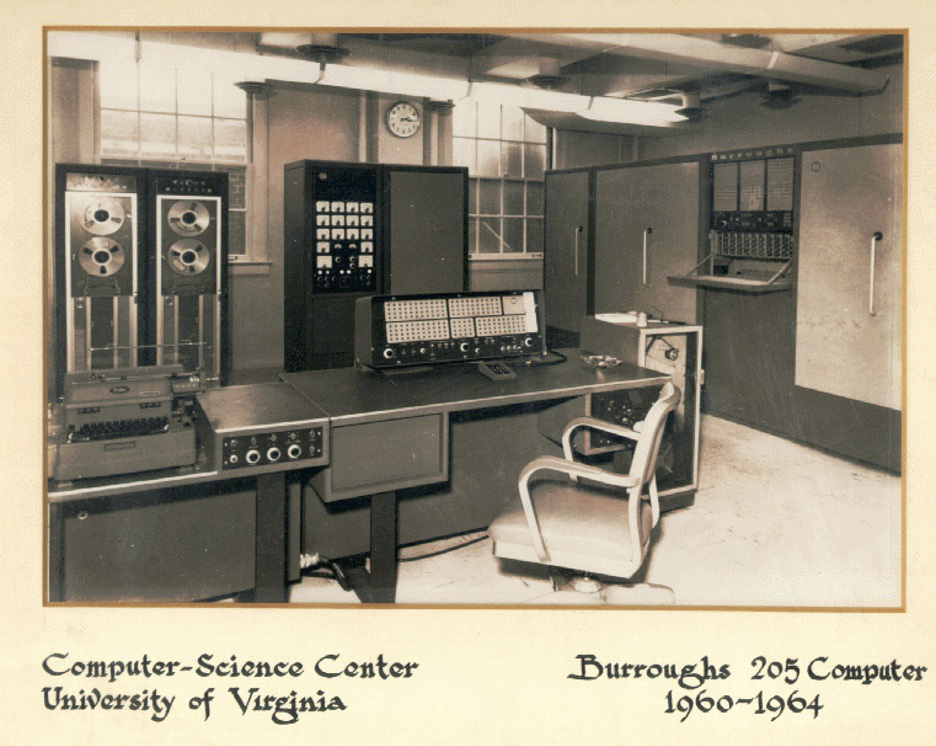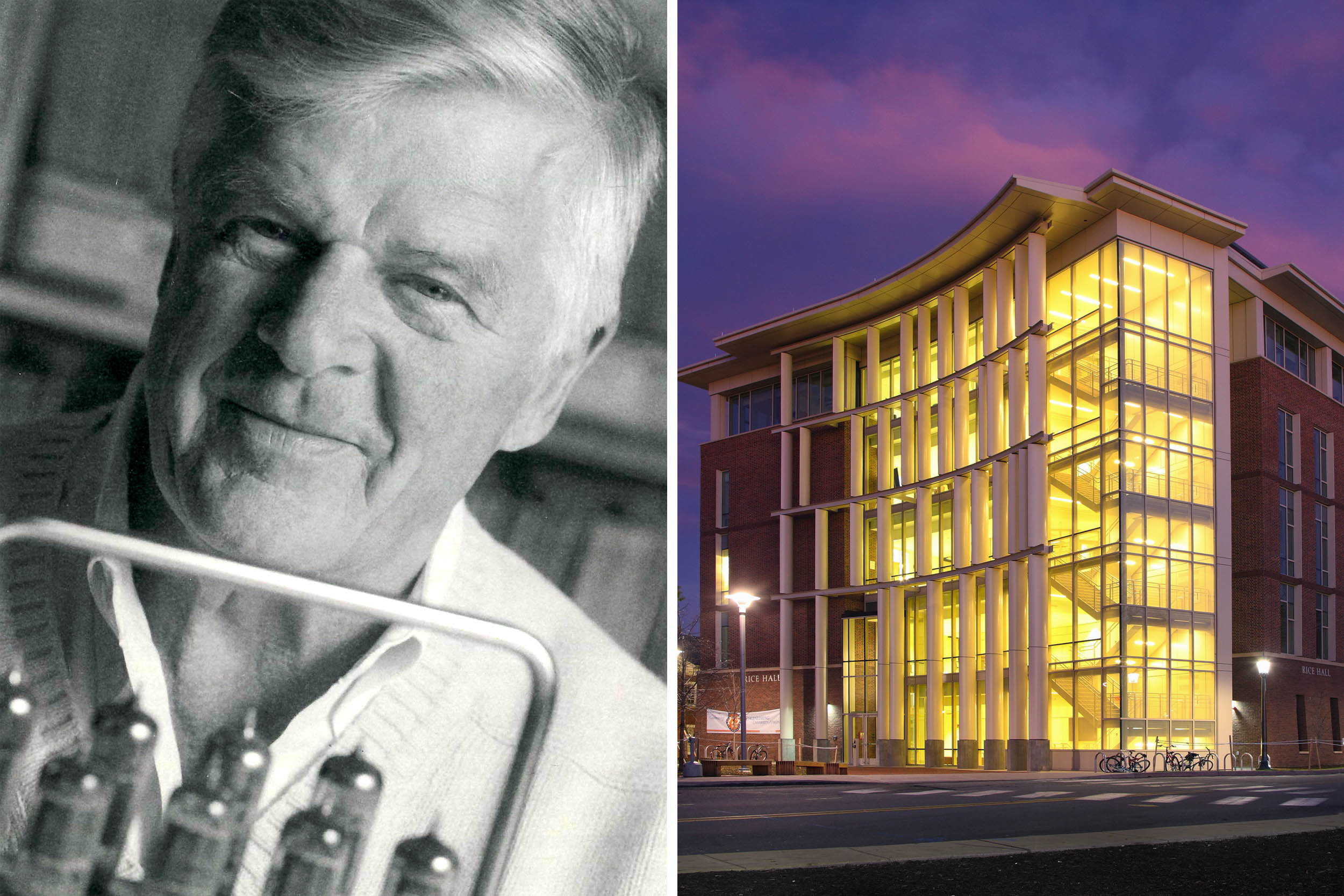When Alan Batson joined the University of Virginia faculty in 1958, he came with a vision for a future powered by computers. He led a two-year study of computing at UVA, and oversaw the purchase of the University’s first computer in 1960.
Batson, a professor emeritus of computer science at the School of Engineering who is remembered by colleagues and former students as the father of computing at UVA, died Aug. 29 at the age of 87.
After the purchase of the Burroughs 205 mainframe computer in 1960, and its successor the Burroughs 5000, Batson established UVA’s first academic computing center. He served as the center’s director for 25 of his 42 years at the University. In 1994, the center merged with the administrative computing center on Grounds to become what is now Information Technology Services.
A decade before the merger, and as mainframes were starting to become obsolete, Batson was already working to make networked personal computers a reality at UVA.
Driven by the belief that a computer laboratory was a fundamental student resource at any engineering school, he rolled up his sleeves and solicited support from AT&T to open the first computer lab in Thornton Hall in 1984, equipped with 128 personal computers.
Donald E. Brown, W.S. Calcott Professor of engineering and founding director of UVA’s School of Data Science, points to the profound effect Batson’s computing vision had on the future of the University.
“I think of Alan’s work in academic computing as the foundation for what we now call research computing. He did such a great job at building the core competency of academic computing in the early days,” Brown said. “His work really put UVA on the map and kept us very much at the forefront of technology.”

Batson was also instrumental in creating the educational program required to lead UVA into the information age. In 1964, he joined forces with professor Robert Hunter Owens to establish the Department of Applied Mathematics and Computer Science, before they became separate departments.
Owens was the chair of the new department, and Batson joined as the first and only computer science professor at UVA Engineering in 1967. There were only two graduate students in the program at that time. Batson advised one of those students, William Alan Wulf, who became the first computer science Ph.D. graduate of the University in 1968 and one of the first computer science Ph.D. recipients in the world.
Wulf went on to become internationally renowned for groundbreaking research in programming languages, compilers and computer design, and returned to UVA in 1990 as the AT&T Professor of Computer Science. He also served as the president of the National Academy of Engineering from 1996 to 2007.
Wulf, now a professor emeritus, reflected on his decision to join UVA Engineering in an interview with Jeffrey R. Yost of the Charles Babbage Institute in 2015. Wulf only considered undertaking his doctoral research at schools that had a computer. UVA was one of 12 in the country that had them at that time, thanks to Batson.
Batson also became Wulf’s cherished colleague and continued to serve as a mentor and personal advisor to Wulf throughout his career. “Batson had this incredible impact on me and made me realize the impact that an individual faculty member can have on the whole life of a student,” he said.
In 1992, Batson and Wulf created UVA’s Institute for Advanced Technology in the Humanities, or IATH, funded with a gift from IBM. The central mission of the initiative was to provide humanities scholars with the resources to interpret the human record in electronic form.
Envisioning a future when digital technologies would rapidly merge with all forms of research, Batson and Wulf wanted to fund technologies that most humanities scholars could not yet anticipate, leaving them potentially under-resourced on their projects in the face of technological evolution.

Batson joined the physics department in 1958 when UVA did not have a single computer. He oversaw the purchase of UVA’s first computer, a Burroughs 205 mainframe, in 1960. (Contributed image)
Dean of UVA Libraries John M. Unsworth was the first full-time director of the institute. He recalled fondly Batson’s sometimes solitary insistence on the institute’s research focus.
“There were those who wanted the IBM gift to go to instructional technology, and, as I understand it, Alan was the one who held the position that if you want to change an academic culture, you change the way people do their research, and changes in teaching will follow,” Unsworth said. “I think the experience of IATH fellows demonstrates that he was correct.”
Anita Jones, University Professor emerita in the Department of Computer Science, credits Batson’s vision for helping creative people make a difference and advance society.
“While insightful humanities researchers saw that information technology should open new dimensions, it was Alan and Bill [Wulf] who understood how to begin to ‘get there.’ As computer scientists, they could envision the aspects of digitization and digital analysis of what might come to pass in ways that a humanist – at that time – likely could not,” she said.
The support of the institute empowered some of its first fellows to become leaders in their fields.
“Jerry McGann went on to win a MacArthur Prize for his Rossetti ‘edition,’ a non-sequential hyperlinked analysis of Dante Rossetti’s poetry and art,” Jones said. “Edward Ayers became a prominent historian, in part from his innovative digitization of maps and text from the two sides of the Valley of the Shadow.”
Ayers’ Valley of the Shadow project digitally archives original letters, diaries, newspapers, speeches, census and church records left by men and women in Augusta County, Virginia and Franklin County, Pennsylvania during the Civil War era.
“Alan’s intelligence, curiosity, sense of humor, and patience with the humanists allowed us to accomplish something that would otherwise have been impossible,” said Ayers, who from 2001 to 2007 served as dean of the UVA College and Graduate School of Arts and Sciences and later became president of the University of Richmond.
Gabriel Robins, an emeritus professor in the Department of Computer Science, had conversations with Batson that shed light on his desire to support humanists. In 1968, Batson compiled a digitally produced concordance of the plays and poems of the French dramatist and playwright Jean Racine.
“Alan told me that he typed in the individual lines of Racine’s plays and poems onto keypunch cards, and then he wrote a computer program to read in those keypunch cards and sort that list of data lines according to various criteria and key words,” Robins said. “The output of Alan’s computer program was published as a two-volume book that gave humanists an easy way to analyze and study Racine’s works. This project was one of the world’s earliest uses of computers to help humanities scholars in such a systematic manner.”
In a 1964 paper entitled “Pie in The Sky,” Batson foreshadowed the role that computers would play at universities by the year 1975. “The prospects for 1975 are hidden from us now, and we have only guesses at the future, and these will certainly fall short of the mark,” he wrote. “Of one thing we can be sure: the computing machine, its power magnified by advanced programming, will be of great cultural importance in the years to come.”
Batson outpaced his own prediction by establishing the computer center, launching the computer science department and graduating one of the nation’s first computer science Ph.D. students, all before 1968. He served as chair of the department from 1996-1997. His influence on cultural research continues to this day.
“Alan had vision for how to keep UVA at the forefront of research and education, and for the importance of interdisciplinary collaboration. He was willing to work hard and stand his ground to help the University achieve that vision,” said Kevin Skadron, Harry Douglas Forsyth Professor and chair of the Department of Computer Science. “His foresight shows up time and time again – in his push for UVA to enter the computer era, in co-founding the Department of Applied Math and Computer Science, in co-founding the Institute for Advanced Technology in the Humanities, and more. We were very lucky to have him as a leader at UVA, as well as having him as a friend and mentor.”
He is also remembered for his ability to crush anyone in a game of squash, all with a broad smile and generous sense of humor. In intellectual pursuits, that intensity exhibited itself in pragmatic approaches to getting the job done in the most logical manner.
“I played squash regularly with Alan at the Albemarle Racquet Club. Alan was a kind, seasoned leader, with a mathematician’s wry and lighthearted sense of humor, a Brit’s sense of irony, a whip-sharp intellect, and an unwillingness to tolerate much in the way of foolishness,” said Kevin Sullivan, associate professor of computer science. “I really liked Alan, and I will miss him.”
Batson continued teaching until his retirement in 1999. After retirement, he was able to focus on his passion for gardening. He planted an enormous vegetable garden and spent time with family and friends. He is survived by his wife, Alice Howard; four children, Oliver Batson, Hilary Besse, Laura Bowers and Claire Drew; 10 grandchildren; and six great-grandchildren.
Media Contact
Article Information
September 17, 2020
/content/memoriam-alan-batson-father-computing-uva

